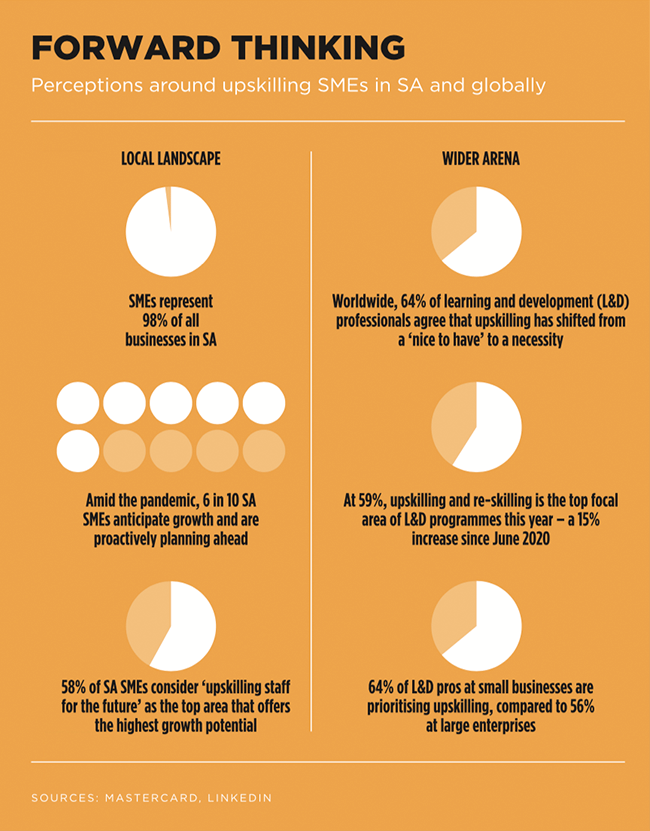For many small businesses, the staff shape the company culture, meaning it’s important to hold onto those people who made the business what it is. ‘If an SME owner makes learning and skills development an ongoing, engaging, motivating and focused part of their skills-development plan, as well as the employee’s performance-management plan, then continuous improvement and self-development becomes part of the team’s DNA and the company’s culture,’ says Elmarie Pretorius, managing owner at the Mindspa Institute, a company that specialises in skills development. Pretorius emphasises the importance of training and development for SMEs by quoting Henry Ford… ‘The only thing worse than training your employees and having them leave is not training them and having them stay.’
Learning and development improves productivity, boosts profit and helps companies gain and retain top talent. All of this gives companies an edge. ‘People are a massive competitive advantage if they are trained well and upskilled regularly,’ says Pretorius. ‘Organisations that understand this create true differentiation over their competition, sometimes without them even knowing it.’
On the flipside, companies that fail to give their staff opportunities for growth and development risk losing them to companies with a more attractive offering. Research has shown that staff training and development improves employee retention. According to a LinkedIn workforce learning report, 93% of employees surveyed said they will stay longer at a company that invests in their career development. ‘Staff are more likely to feel valued if they are invested in and therefore, less likely to change employers,’ says Pretorius. ‘Training and development is seen as an additional company benefit. Recruitment and employee turnover costs therefore go down due to staff retention.’
Up-to-date knowledge and skillsets make for a stronger business that is better equipped to stand its ground in a competitive economy – and thus more likely to be successful. When it comes to effective employee upskilling, Pretorius says it is important to align your training plan with your business’ goals and needs, find a balance between organisational and individual employee development needs, and make learning and development part of your performance-management processes. ‘See your learning and development budget as an investment, not a cost,’ she says. ‘And partner with a training company that cares about your business, understands your requirements, and fits in with your company’s values and vision.’ According to Pretorius, the skills and knowledge sets that are most important to keep current include problem-solving and critical thinking, effective communication and the art of listening, and emotional intelligence and wellness. Customer care, time and stress management, confidence and management development round out her list.
Skills development can be undertaken in various ways and forms, including on-the-job learning, mentoring or coaching schemes, individual study, and in-house training. It can be conducted face-to-face or form part of an online programme; it could be take place formally, through a planned and structured curriculum, or informally, with learning stemming from daily job-related activities.

Online learning has become increasingly popular in recent years – even more so in the wake of the COVID-19 pandemic. Online learning offers technical knowledge quite literally at a person’s fingertips. It is also a cost-effective way to upskill teams, with many institutions offering a range of low-fee or free courses. Some of these will even issue a certificate on completion. Providers include edX, FutureLearn and Coursera, though you can also boost your mental arsenal with learning from Stanford Online, Open Yale Courses, the University of California’s Berkeley Class Central, and MIT OpenCourseWare.
Gert du Preez, sales manager of training-solutions company SpecCon, says the majority of companies, including SMEs, were propelled into Industry 4.0 due to the pandemic, forcing everyone to adjust to a training-delivery methodology that focuses on a blended approach, with online training as the basis. He says this has prompted individuals to embrace change, focusing on the virtual sphere. ‘What people forget is that for years Unisa was the one training institution that applied the distance-learning methodology, forcing participating individuals to apply a massive sense of self-discipline,’ he says.
SpecCon’s most popular courses, he adds, are IT, business admin and generic-management related, as they are all facilitated fully online, easily accessible and competency based. What a person studies today they can apply immediately in their daily work routine.
As for low-fee or fee-free courses, Du Preez says training should not be seen as a cashflow burden. ‘We assist SMEs to find the most cost-effective ways to fund their training and development strategies that will keep them compliant in terms of employment equity and their B-BBEE scorecards. The 12H tax rebate strategy we apply will allow companies the opportunity to upskill their employees without effecting their bottom line.’
Small Business Institute (SBI) CEO John Dludlu says training and development should be seen as a fundamental investment to the corporate strategy of any business. ‘This is as important as access to markets, information and funding,’ he says. The SBI represents 76 business chambers comprising 114 000 SMEs, and it advocates policies and laws that promote the development of formal and informal SMEs in SA. Through partner organisations including Telkom Business and Google Africa, as well as higher-education institutions, the SBI regularly provides masterclasses to SME owners on a range of topics that empower them.
Dludlu says the biggest change in the training needs of SMES concerns delivery platforms. ‘In an environment where physical meetings are discouraged, it’s critical that SME owners adopt new ways – such as online platforms – to deliver training and development, and to maintain team cohesion as much as possible.’ He adds that ‘getting better at what you do is key to survival, hence the need for refresher courses and staying abreast of developments in your industry’.

The National Small Business Chamber (NSBC), a non-profit membership organisation that has a current base of more than 141 000 SMEs and many global brands as partners, has a range of webinars available aimed at helping small businesses build themselves into bigger and bolder enterprises. Covering topics such as sales and marketing, networking and doing business digitally, among many others, and taking the form of interviews, conversations and videos, these resources are available on the NSBC’s website at no cost.
Doing their bit for small-enterprise development, many of SA’s large corporates provide training and skills improvement to smaller companies in their supply chain. One of these is South African Breweries (SAB), which has an in-house supplier-development business incubator, the SAB Accelerator. The programme assists small-scale companies (with an annual turnover of up to R50 million) that are, or have the potential to be, part of its supply chain.
The SAB Accelerator has a team of business coaches who work with the participants to identify improvement opportunities; provide them with skills, training and a coaching development plan to close any gaps; and to support the growth ambitions of the business owner. It achieves this through skills workshops covering topics such as business strategy, sales and marketing and finance, as well as technical topics that include maintenance, operations management, quality management, and health and safety. Learning takes the form of classroom training workshops and regular on-site coaching for the supplier’s management and shop-floor teams.
In the mining sector, Northam Platinum runs an entrepreneur-skills development and incubation programme through which owners of local SMEs are coached on pricing tendering, invoicing, branding and other capacity-building initiatives. During the 2020 financial year, more than 100 local, community-based entrepreneurs attended this programme, which also offers mentoring to these SMEs. Similarly, Implats supports fledgling businesses through its supplier development programme, which sees local SMEs that are part of its supply chain trained and mentored through its business incubator programme, offered by Raizcorp and Aurik.
Recent times have been extremely tough for businesses – regardless of size – but it appears confidence levels are on the rise. This is according to Business Partners Limited, a specialist risk-finance company for formal owner-managed SMEs. The Q1 2021 Business Partners Limited SME Index survey, which measures the attitudes and confidence levels of SA SME owners, found that SME owners are confident that their businesses will grow in the next 12 months.
David Morobe, regional manager of Business Partners Limited, says that SME owners seem to be shifting their focus to more practical challenges to improve the ease of doing business, and are clearly seeing a silver lining and opportunity to rebuild in 2021, despite recognising that the economic landscape will continue to present many real challenges. ‘The general attitude of finding solutions to work around these challenges is a good sign – indicating a positive and resilient mindset,’ he says. ‘This goes to show how robust and adaptable SMEs truly are. What the SME sector really needs now is practical barriers such as red tape, access to finance, markets and upskilling opportunities to be removed.’








